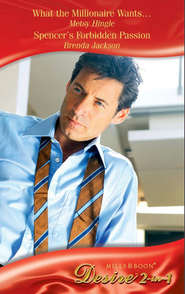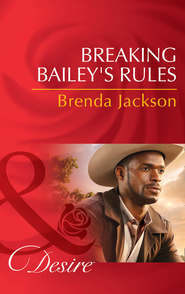По всем вопросам обращайтесь на: info@litportal.ru
(©) 2003-2025.
✖
The Millionaire's Club: Jacob, Logan and Marc: Black-Tie Seduction / Less-than-Innocent Invitation / Strictly Confidential Attraction
Автор
Год написания книги
2019
Настройки чтения
Размер шрифта
Высота строк
Поля
“I run a clean town,” he said. “I don’t want any trouble from you.”
He looked stern and angry and so very serious when he talked to me. And yet he didn’t arrest me, this man who walks on the opposite path that fate has set for me.
Sheriff Brad Webster. Just writing his name makes my heart kick around inside my chest like a string of wild ponies. Saying it out loud makes my fingers tremble and my face flush hot and sends strange warm flames licking through my belly. You’d think I’d been smoking locoweed. And it is loco for me to be so obsessed by him.
But despite his anger at me, he is the most beautiful man…if a man can be called beautiful. I remember some years ago Daddy and I were riding strays and we came upon this herd of wild mustangs. The stallion was big and ink-black and, oh, he was the prettiest thing I’d ever seen. Sleek and muscled, tall and strong. One look in that big guy’s eyes and you knew he was proud and brave.
That’s what I thought when I saw the sheriff. Like that wild stallion, he is proud and brave. His hair is ink-black. His eyes are the most fascinating Texas-sky-blue. And tall. Lordy, is that man tall. But he’s no beanpole. Oh, no. He’s got the build of a working man. And he’s a man who believes in duty.
Duty. His duty is why I must stop carrying on about him so. Brad Webster wears a badge that says he’s the law. And everything about the way he carries himself says he is as loyal to the law as I am loyal to the cause that has taken me on the wrong side of it.
Dear, dear diary. Is there anything in life that is fair? Why does everything have to be so hard? I have met a man who makes me want to forget what drove me to a life of crime. But I can’t forget. I can’t. Just as I can’t forget that this amazing, beautiful man may be forced, by duty, to end my very life. Even worse, I may be forced to end his.
Chapter One
One man’s trash. Another man’s treasure.
The old cliché wound around inside Christine Travers’s head like a coil of barbwire as she stared, disbelieving, at the treasure she’d just discovered.
The good folks of Royal, Texas, had dug deep into their basements and attics to come up with items to donate to tonight’s auction. There were antique crystal pieces. Complete china sets. Magazines that dated back to the early nineteenth century. Furniture and painstakingly hand-stitched quilts. And then there was this box.
Her breath stalled. Her heart beat so fast and so hard, she was afraid she might pass out. Right here. Right smack in the middle of this crowd of upper-crust residents, including a large contingent of Texas Cattleman’s Club members—the infamous and elite philanthropic organization that had staged tonight’s fund-raising auction to benefit Royal’s upcoming one hundred and twenty-fifth anniversary celebration.
So, no. Passing out would not be good form any way you sliced it. And the last thing she would ever want to do was bring attention to herself—for any reason.
Okay, Christine. Settle down. Take a deep breath. Another.
Steadier now, with her fingers only marginally tingling, she glanced around the auction house to see if anyone was watching her with an odd expression—a sure sign she’d either screamed out loud, jumped up and down or done something equally ridiculous and brought unwanted attention to herself. And to her amazing find.
A relieved sigh eddied out when no one seemed to notice her excitement. Almost everyone who had turned out was busy browsing. Well, almost everyone.
Some of the Cattleman’s Club members, including Jacob Thorne, she’d noticed with dismay, were laughing and joking by the bar across the room.
Why did he have to be here?
Christine made it a point to avoid Jacob Thorne. If he spotted her tonight, she had no doubt that, true to form, he’d make it his personal mission to give her ten different kinds of grief. What she’d ever done to deserve his teasing and goading—other than help save his miserable life—was beyond her.
Well, she wasn’t going to think about him tonight. She had another meatier, much more exciting matter to attend to. Rows and rows of tables were filled with items that would soon be up for bid. Among those items Christine had found buried treasure—or the next best thing to it. The contents of this box, according to the notation, came from the late Jonathan Devlin’s attic.
Oh. My. God.
“Is it hot in here?” Christine asked her friend, Alison Lind, as she fussed with her plain white blouse that she’d buttoned all the way up to her neck.
“It’s Texas. It’s July,” Alison said, deadpan. Her dark eyes sparkled in her pretty chocolate-brown face. While Christine was usually cautious about opening herself up to someone, she’d sensed a kindred spirit in Alison. They’d met at a self-defense class a few months ago and had been fast friends since.
“Okay. Rhetorical question,” Christine conceded. “It just seemed extra warm there for a minute.”
Alison gave her friend a look and an “Uh-huh,” then walked on ahead of Christine toward a bolt of red satin.
“All right,” Christine whispered to herself and wiped damp palms on her tailored navy slacks. “Get a grip.”
Act cool. Don’t let on that you may have just discovered what must have appeared to be nothing more than an old, musty-smelling saddlebag to the late Jonathan Devlin’s family. Nothing more than a novelty item someone might want to bid on to decorate a bar or a tack room—instead of a major historical find.
Well, they could bid, she thought fiercely, but she was going to leave here with the contents of this box. That’s because she knew something no one else did. She was ninety-nine-point-nine percent certain that she knew who the saddlebag had once belonged to.
“What’s got you so fidgety?” Alison asked, wandering back to Christine’s side. She tried to peek into the box.
Christine quickly flipped the lid shut.
“Can you keep a secret?” Christine whispered, cutting a covert glance around her.
Alison frowned. “If the secret is that you’re having a minor manic episode, no, I don’t think so. The paramedics who treat you will need details.”
Ignoring her friend’s sarcasm, Christine gripped Alison’s arm and pulled her close. She lifted the lid on the box. The smell of old leather and dust seeped into the air. “See this saddlebag?”
“Oh—I get to look inside now?”
Christine pulled a face. “Yes, you get to look inside.”
Still acting wary, Alison did.
“Notice the rose tooled on the cover flap?”
From Alison she got a slow, skeptical nod.
“The rose is what drew my attention. So I checked inside the bag,” Christine confided in a low voice, “and found a pair of six-shooters. Old six-shooters, with roses carved into the ivory handles.”
“And…” Alison said in a leading tone as Christine cast more worried looks around them.
“And there’s also a delicate little purse. Again—old. Rose-colored—with what appear to be rose petals inside. Plus—” she huddled up with Alison and whispered “—there’s a map.”
She snatched Alison’s hand back with an apologetic look when Alison started to reach inside the saddlebag. “A map with hearts and roses twining around the edge.”
“Okay. I’ll play along,” Alison said, still frowning as though she thought Christine had blown a circuit. “I’m guessing there’s some major significance to all these roses?”
“You don’t know the half of it,” Christine said. “I’m positive these things once belonged to Jessamine Golden.”
When Alison made a “who?” face, Christine closed the box, then tugged Alison away from the table and hustled her into the line of people waiting to acquire bidding numbers.
“Jessamine Golden is a legend in Royal,” she explained in a low voice so no one would overhear. “She was an outlaw a hundred years ago who not only stole the heart of the town sheriff, Brad Webster, but legend has it that she also stole a huge gold shipment and hid the treasure somewhere in the Royal area. And she loved roses.
“Thanks,” she said absently when the clerk gave her a paddle with a number on it. She walked Alison to the row of seats lined up in front of the podium where the bidding was already under way.
“Anyway, the rest of the story is that the mayor of Royal back then was Edgar Halifax—”
“Halifax?” Alison interrupted. “Any relation to Gretchen Halifax, our illustrious city councilwoman?”
Gretchen Halifax wasn’t an illustrious anything except in her own mind, and both women knew it, but Christine didn’t want to get sidetracked with talk about Gretchen. She’d had to deal with Gretchen on the new Edgar Halifax display at the museum and that had been more than enough exposure to the woman. Christine always was willing to give people the benefit of the doubt, but in this case the stories about Gretchen appeared to be true. The councilwoman was pompous and self-important and on more than one occasion had been very condescending toward Christine.











